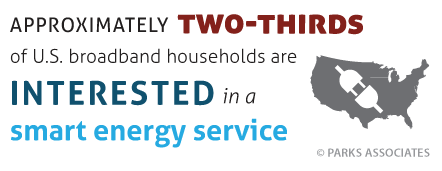Smart Home Products Market Set to Double by 2017
 In a recent article for the New York Times, Steve Lohr writes that consumers purchase smart home products for a number of reasons, including environmental worries, financial savings, and the physical appeal of smart home merchandise.
In a recent article for the New York Times, Steve Lohr writes that consumers purchase smart home products for a number of reasons, including environmental worries, financial savings, and the physical appeal of smart home merchandise.
Lohr included Parks Associates research to show the increase in sales of energy-related smart home products. Valued at $850 million, Parks Associates research shows consumers purchased 10 million smart thermostats, plugs, power strips, and lights last year. Parks Associates also forecasts that the smart home products market will almost double to 19 million units sold by 2017, totaling $1.6 billion in revenues.
Additional Parks Associates research finds 85% of consumers took energy-saving actions in the past year, and 10% of U.S. broadband households already own a smart energy device. However, awareness of smart energy devices as well as smart home devices and systems remains low—research shows only 14% of U.S. broadband households are currently familiar with energy management products, such as a smart thermostat, light bulb, power strip, or plug adapter.
Sales of smart energy devices are increasing, despite the lack of awareness. However, Lohr wonders if they really reduce energy consumption as promised. The Nest, a device launched in 2011, did deliver major energy savings (7-17%) on average for gas heating and electric cooling. But based on a household’s total gas and electricity, energy was reduced by only 2-8%.

The more advantageous benefit, Lohr says, of new home science is the part it plays in the broader spectrum of ecosphere of energy management. If enough energy-reducing actions are taken and consumers reduce peak energy periods, smart home products have a greater impact on energy efficiency. Companies realize this potential and are now starting to offer rewards to consumers for using smart home devices, especially during peak times.
Speaking at the Smart Energy Summit, hosted by Parks Associates in Austin in February 2015, Tom Kerber, Director of Home Controls and Energy Research at Parks Associates, remarked, “Strong consumer interest in value-added monitoring services opens important revenue opportunities in the energy markets. However, success requires market strategies that offer unique bundled offerings, combining monitoring services enabled by connected products with more traditional service contracts and home warranties.”
To read the full New York Times article, click here. For more information on Parks Associates home energy management and smart home research, visit our website.
Further Reading:
- 70% of U.S. broadband households interested in one or more home energy management features
- Digital Engagement of Energy Consumers
- The Internet of Things: Business Models & Opportunities
Next: Connected Home Market Continues to Expand offering New Opportunities for Ecosystem Players
Previous: Leveraging Big Data is Key to Growing Energy Efficiency Programs
Comments
-
Be the first to leave a comment.
Post a Comment
Have a comment? Login or create an account to start a discussion.


